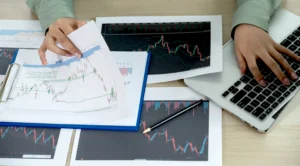The question of fairness in retail vs. institutional forex trading is more relevant than ever. Every day, millions of retail traders log in, eager to earn from the world’s largest financial market. Yet, institutional players like banks and hedge funds still dominate daily trading volumes. This divide raises concerns about forex market inequality and sparks heated debates over institutional trading advantages. Are retail traders at a natural disadvantage, or is the game genuinely rigged against them?
Understanding the Forex Market Structure
The forex market is massive and complex. It operates 24 hours a day and facilitates currency exchanges worth trillions of dollars daily. Institutional traders account for the bulk of these transactions. Their orders move the market, set trends, and provide essential liquidity.
Retail traders, however, represent a much smaller part of the action. They typically access forex through online brokers, trading smaller lot sizes and often using leverage. This difference in access and influence lays the foundation for forex market inequality.
Retail traders rely on broker platforms for pricing, trade execution, and order routing. Institutional traders connect directly to interbank liquidity pools. This connection gives them faster execution and better prices. Retail participants, by contrast, may experience delays, wider spreads, or even price slippage during volatile periods. These issues contribute to forex trading disadvantages for individuals.
How Institutions Gain the Upper Hand
Institutions benefit from several structural advantages. First, they enjoy lower trading costs. Large order sizes allow them to negotiate the tightest spreads and pay minimal commissions. They also get instant access to deep market liquidity, ensuring their trades execute efficiently.
Retail traders face higher spreads and may encounter hidden fees. Many brokers widen spreads during news events or periods of high volatility. Execution speed is another issue. While institutional trades are prioritised and often filled instantly, retail orders may be delayed or only partially filled.
This difference in execution quality is a core institutional trading advantage. Over time, these small cost and execution differences accumulate, eroding retail profits and creating real forex trading disadvantages for individuals.
Technology and Trading Tools
Institutional traders have access to advanced technology. Their trading systems use artificial intelligence, high-frequency algorithms, and direct market feeds. These tools process massive amounts of data in real time, spotting opportunities and managing risk with precision.
Retail traders use commercial trading platforms such as MetaTrader or cTrader. While these platforms are powerful, they cannot match institutional speed or customisation. Home internet connections and basic APIs further limit the retail trading experience.
Institutions invest millions in developing proprietary tools. Teams of analysts, developers, and quants design custom indicators, data analytics, and execution algorithms. Retail traders rarely have access to these resources, increasing the forex market inequality. This technology gap makes it difficult for individuals to compete on equal footing and highlights clear institutional trading advantages.
Information and Analysis
The role of information cannot be overstated. Institutional traders have access to premium news feeds, real-time order flow data, and in-depth research. They can interpret central bank actions, economic indicators, and political developments instantly.
Retail traders depend on public news, economic calendars, and broker-provided data. Their information is often delayed or less detailed. As a result, institutions can act before retail traders even receive the news. This information gap adds another layer to forex trading disadvantages for individuals.
A retail trader might respond to a news headline minutes after it breaks. By then, institutional traders have already acted. Prices may have moved significantly, leaving little profit for latecomers. This recurring issue is one of the most challenging retail trader challenges in the market.
Regulation and Legal Framework
Regulation protects market participants, but it also creates differences. Retail brokers must follow strict rules on leverage, disclosures, and fund protection. These regulations prevent fraud and limit catastrophic losses. However, they also restrict the tools and strategies available to retail traders.
Institutions negotiate custom contracts and operate with greater freedom. They enjoy higher leverage and access to a wider array of products. Institutions can also structure deals for tax or capital efficiency. These regulatory and legal distinctions form another institutional trading advantage.
Retail traders must accept the terms set by regulators and brokers. When markets become volatile, institutions can often secure special terms or additional liquidity. Retail traders have no such negotiating power, which intensifies forex market inequality.
Risk Management
Risk management is critical in forex. Institutions use complex hedging strategies, portfolio diversification, and automated monitoring. Teams of experts track every position and adjust exposures in real time.
Retail traders manage risk alone. Most use stop-loss orders or basic position sizing. High leverage increases the risk of sudden account loss. In fast-moving markets, stop-loss orders can be skipped or filled at much worse prices than intended.
Institutions survive shocks through discipline and resources. Retail traders often face margin calls and forced liquidation. This gap in risk management is a major forex trading disadvantage for individuals. For retail traders, the risk of ruin is always higher, no matter how well they plan.
Emotional and Psychological Challenges
Trading is not just a technical pursuit; it’s deeply psychological. Institutions provide traders with structured support. Colleagues, managers, and even psychologists help keep emotions in check. Professional environments encourage discipline, patience, and continuous learning.
Retail traders operate in isolation. They feel every loss alone and make decisions without oversight. It is easy to overtrade, chase losses, or deviate from a plan. Emotional trading is one of the hardest retail trader challenges to overcome.
Institutions analyse mistakes and reward process, not just profits. Retail traders must rely on self-discipline. Without support, emotional swings often lead to bad trades and lost capital. This emotional burden adds to the long list of forex trading disadvantages for individuals.
The Role of Education
Education shapes trading results. Institutional traders train for years. They learn from mentors, attend workshops, and adapt through experience. Their development is continuous and research-driven.
Retail traders often rely on free online resources or marketing materials from brokers. Many fall victim to myths and unrealistic promises of quick riches. The abundance of poor-quality education is a hidden forex market inequality. It creates confusion and sets up new traders for failure.
Quality education is available, but retail traders must learn to filter hype from reality. Patience, discipline, and sound processes matter more than tips or shortcuts. Those who focus on continuous improvement can reduce some forex trading disadvantages for individuals.
Retail vs. Institutional Forex Trading
Let’s consider a typical trading day. Institutional traders gather before the market opens. They review overnight developments and consult real-time data. Analysts provide fresh insights, and teams discuss risk scenarios. Decisions are made with the support of technology and experience.
Retail traders log in alone, often after work or between tasks. They scan news feeds, check charts, and look for signals. Their access to data is slower, and their execution is less precise. If a sudden event moves the market, institutions act instantly. Retail traders may miss the move or enter late.
During a major news release, institutions split large trades across platforms for stealth and efficiency. Retail traders must accept whatever prices brokers offer. Slippage, delays, or rejected orders are common. These experiences illustrate the real-world impact of forex market inequality and show how institutional trading advantages play out.
Real-Life Example: Central Bank Announcements
Imagine a central bank announces a surprise rate hike. Institutional traders receive the news instantly via direct feeds. Their systems analyse the likely impact and trigger orders in milliseconds. Prices move sharply as institutional flows enter the market.
Retail traders see the news a few moments later, perhaps through a broker update or public website. By the time they react, the best trading opportunities have vanished. Their trades are filled at new, less favourable prices, or not at all. This example clearly shows the forex trading disadvantages for individuals and explains why so many struggle to keep up.
The Comparison in Practice
In reality, the system is not illegal, but it does favour institutions by design. They hold the cards when it comes to technology, access, cost, information, regulation, risk management, and psychology. Retail traders face obstacles at each step, but the market is not entirely closed to them.
Retail success stories do exist. Some individuals succeed by focusing on education, risk management, and discipline. They accept that overnight riches are rare and instead work on steady, realistic growth. Still, the retail trader challengesare ever-present, and most struggle to sustain long-term profits.
Will the Gap Ever Close?
Technology is making a difference. Retail traders now have access to better data, faster platforms, and more transparent brokers. Regulatory improvements are also levelling the field, though institutional trading advantages remain strong.
Education is more accessible, but only if traders are willing to invest the time and avoid hype. Automated trading, social platforms, and copy trading networks give individuals new ways to compete. However, the divide will not disappear. Institutions will always have better tools, more resources, and faster information.
In the end
The truth about retail vs institutional forex trading is that the market favours those with resources, speed, and experience. Retail traders can succeed, but only with preparation and patience. They must learn to control risk, filter good information, and stay disciplined under pressure. Success is possible, but the journey is steep and demanding.
To thrive, retail traders should embrace education, limit leverage, and avoid emotional trading. Understanding the reality of forex market inequality is the first step toward realistic goals and long-term results. By facing the facts, adapting strategies, and continuously improving, retail traders can compete—even in a game where the odds favour the house.
Read here to learn more about Weekend Gaps in Forex Safe Opportunity or Real Danger

I’m Chaitali Sethi, a financial writer and market strategist focused on Forex trading, market behaviour, and trader psychology. I simplify complex market movements into clear, practical insights that help traders make better decisions and build a stronger trading mindset.

